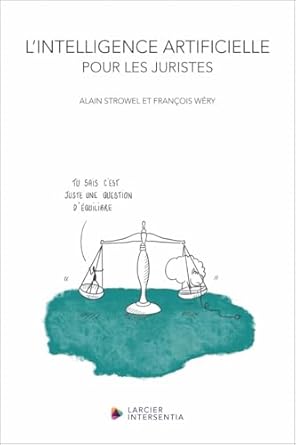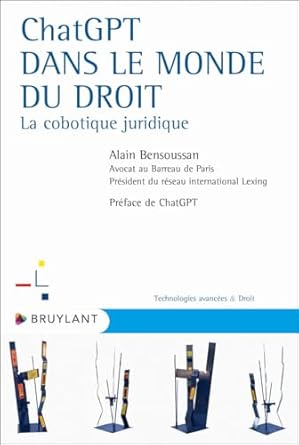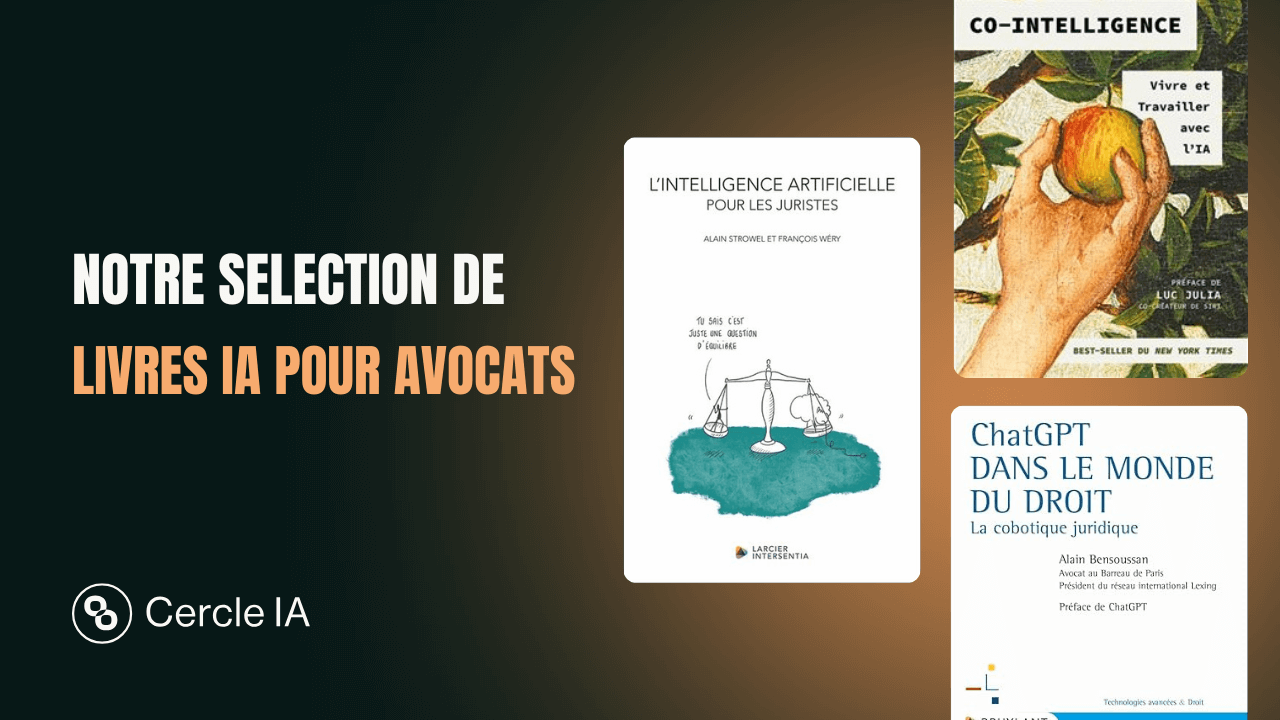The adoption of artificial intelligence in the legal sector has reached a decisive milestone: for lawyers and their clients alike, the question is no longer whether to use it, but how to integrate it properly.
The figures speak for themselves: internationally, the proportion of legal professionals using AI rose from 19% in 2023 to 79% in 2024 (sources: Legal.io, 2024 – LawNext, 2024). In France, by 2023, almost one in two lawyers had integrated or was preparing to integrate AI into their daily practice (source: LexisNexis).
This transformation isn’t just coming from law firms: customers are following suit. In 2024: 70% of legal services customers said they were favorable or neutral to the use of AI by their legal counsel (sources: Legal.io, 2024 – LawNext, 2024).
Faced with these challenges, it’s essential to read reference works to keep up to date (and stay up to date). There are many issues at stake: understanding the underlying mechanisms of AI, its practical applications and ethical implications, and so on.
To guide you through this process, this article presents a selection of three complementary books, chosen for their practical approach and direct relevance to legal professionals. Rather than an exhaustive list, we have focused on quality and complementarity.
Our selection is therefore a mix of general AI books and legal textbooks specializing in the use of generative AI in legal practice.
Co-intelligence: living and working with AI (Ethan Mollick - First Editions, 2024)

Why start with this book? Because before you can master legal AI techniques and tools, you need to understand the fundamentals of working with AI.
Published in April 2024, “Co-intelligence: Living and Working with AI” has established itself as an essential reference on the professional integration of artificial intelligence. Its author, Ethan Mollickis a professor at the prestigious Wharton School and author of the newsletter “One Useful Thing”, followed by thousands of professionals. His work focuses on the impact of AI on work and education, and he has been named by TIME magazine asone of the most influential figures in artificial intelligence in 2024.
Ideal for: Practitioners new to AI and looking for a proven methodology
Less suitable for : Those who want highly specialized legal applications right away
To remember: A solid conceptual foundation for more technical works
The book develops the concept of “co-intelligence”, defining a new paradigm of collaboration between human expertise and the capabilities of generative AI. Mollick uses a rigorous methodology, combining academic research and concrete examples of application, to propose a theoretical and practical framework for adopting these technologies.
Throughout Co-Intelligence, Mollick presents AI as a powerful tool to amplify (but never replace) the work of lawyers, jurists and judges. He provides practical examples, encourages ongoing experimentation and insists on human supervision to ensure the ethical and effective integration of AI into legal practice
This book sets out four fundamental principles for using AI well:
- Always invite AI to the table: This principle involves using AI extensively in a variety of tasks, even if its usefulness doesn’t seem obvious at first. The aim is to understand AI’s “jagged frontier”: its capabilities are not uniform, and it can excel at complex tasks while encountering difficulties on seemingly simple ones. It’s through constant experimentation that users best discover AI’s strengths and limitations.
- Always keep the human in the loop: Even as AI becomes ever more powerful, humans must remain active players in the process. This means error checking, supervision, ethical considerations and retaining authority over decisions. This principle underlines the fact that, in many areas, today’s AI operates at a level equivalent to around the eighth percentile of high-performance consultants, making human intervention indispensable.
- Treat the AI like a person (but make it clear what kind of person it is): This principle recommends interacting with AI as if it were human, defining specific roles or personas to optimize its performance. For example, asking the AI to act “like an M&A strategist” or an “international arbitration expert” helps tailor its responses to specific needs. However, Mollick reminds us not to forget that AI has no real understanding: it operates on the basis of statistical models, without any real reasoning.
- Consider today’s AI as the worst you’ll ever use: Given the rapid evolution of AI, this principle prepares users for continuous improvement in the capabilities of these technologies. It encourages staying open to new developments and adapting as AI advances, while keeping in mind that current limitations may be temporary.
Why do we recommend this book to lawyers?
In addition to the interest of considerations applicable to everyone in the world of work, in Co-Intelligence, Ethan Mollick highlights several ways in which AI can have a positive (and potentially negative) impact on legal work:
- Legal drafting and decision support: Mollick describes how generative AI assists lawyers by providing immediate feedback, analyzing large datasets and broadening perspectives in legal drafting. AI helps draft documents, summarize complex documentation and identify relevant data at unprecedented speed and scale, improving context, accuracy and efficiency. However, he stresses that human expertise remains essential for nuanced legal analysis, managing issues such as bias, credibility and the human elements of legal reasoning.
- Practical legal examples: the book refers to real-life legal scenarios, such as a judge using generative AI (Claude.ai) to help draft court orders for litigation. By developing precise instructions and providing reference cases, the judge found AI useful in preparing legal texts, demonstrating the practical potential of AI in everyday judicial and legal processes. Yet Mollick stresses that AI results must always be verified and contextualized by human experts.
- Scaling legal expertise and access to justice: Mollick notes that there is more legal work than lawyers available globally, creating an access to justice deficit. AI can help scale legal expertise, enabling more people to benefit from legal services, but this requires lawyers to hone their skills and actively experiment with AI’s capabilities and limitations. AI is best used to complement, not replace, skilled legal professionals.
- Ethical and regulatory considerations: the book discusses the importance of compliance with disclosure rules, such as declaring when AI has been used in legal filings, reflecting ongoing debates about responsible AI adoption. Mollick stresses the need for careful monitoring and adherence to professional standards to mitigate risks such as “hallucinated” quotes and maintain trust in legal processes.
Limitations to bear in mind: The book remains general in nature, and does not deal with the specific deontological features of French or Belgian law. The legal examples, while relevant, remain a minority in the book as a whole. The author adopts a resolutely techno-optimistic attitude to AI, which may need to be counterbalanced by other points of view.
The original version of Ethan Mollick’s book “Co-Intelligence: Living and Working with AI” was first published on April 2, 2024 by Portfolio/Penguin (USA). The French translation was published on March 13, 2025 by First Interactive.
L'Intelligence Artificielle pour les juristes (by Alain Strowel & François Wery (Larcier, 2025)

The reference manual for law and AI. Where Mollick lays the conceptual foundations, Strowel and Wery provide a didactic, in-depth presentation of the theoretical framework, as well as a veritable “AI toolbox” for lawyers.
This work is a reference manual combining theoretical depth and a practical approach, enriched with tables, diagrams and illustrations. It offers numerous concrete examples and use cases to show how AI can be integrated into everyday legal practice.
Ideal for : Practitioners willing to invest time to master legal AI in practice.
Less suitable for : Those looking for a general, strategic approach to AI.
Ideal complement: Read after Mollick to move from the right mindset to acquiring a solid theoretical and practical background for using AI in the legal profession.
The authors are two renowned experts:
- Alain Strowel has been a member of the Brussels Bar since 1988 and is a senior partner in Pierstone’s Intellectual Property and IT Law department. He has also been a professor at Université Saint-Louis – Bruxelles since 1993 and at UCLouvain since 2013;
- François Wery: Intellectual property lawyer, physicist, European patent attorney, lecturer at UCLouvain.
The book is organized into 3 main parts:
- Part I: What is generative AI?
- Tools and players in generative AI
- AI concepts and operation
- Strengths and limits of generative AI
- Part II: How to put AI to work for lawyers? This practical section proposes in particular:
- The FRITES® model for composing prompts adapted to the law
- The Model 9C™ for conversing with AI.
- Guides to writing, analyzing, brainstorming and researching with AI
- Ethics and confidentiality
- Personal data protection and compliance with the RGPD
- Part III: What are the challenges posed by AI?
- Major societal challenges (environment and employment)
- The risk of misinformation
- Protecting creators and intellectual property
- European regulation of AI
Why do we recommend this book to lawyers?
The first part of the book offers an accessible, in-depth presentation of the theoretical, technological and economic aspects of the development of generative AI. The book is up to date to early 2025, making it one of the most recent references on the subject.
In addition, legal practitioners will find :
- Actionable methods: the book offers unique models such as the FRITES® model for writing effective prompts or the 9C™ model for conversing with an AI. It goes beyond generalities by covering AI-assisted drafting, document analysis, audits and legal research.
- A comprehensive view: the book addresses crucial points such as protecting AI-generated outputs, complying with RGPD, managing bias and copyright issues related to model training.
In short, “L’Intelligence Artificielle pour les juristes” offers just the right balance between academic reference work and operational guide to the use of AI by lawyers and legal practitioners.
ChatGPT in the world of law: legal cobotics (by Alain Bensoussan - Bruylant, 2024)

The first French book dedicated specifically to the use of ChatGPT by legal professionals. The book highlights the concept of“legal cobotics“, an innovative approach in which artificial intelligence acts as a co-pilot for legal professionals.
The author, Alain Bensoussan, has been a member of the Paris Bar since 1978, and is recognized as a pioneer in advanced technology law. In this book, he explores the impact of ChatGPT and generative AI in the legal field.
Ideal for : Practitioners wishing to make the most of ChatGPT while respecting ethical and regulatory requirements
Less suitable for : Those looking for a multi-tool approach to AI
Why do we recommend this book to lawyers?
- Pioneer of “legal cobotics”: Alain Bensoussan is a forerunner in the analysis of AI as an intelligent assistant for lawyers, jurists and magistrates. He proposes a vision where AI is not a replacement, but an essential collaborator that assists with complex tasks.
- Practical, strategic applications: the book details how ChatGPT can be used for drafting contracts, researching case law, analyzing legal documents, or preparing pleadings. It offers a practical roadmap for maximizing the benefits of AI while controlling its risks.
- Ethical and deontological issues: The book addresses the crucial issues of data confidentiality, professional secrecy, the reliability of AI-generated information and the user’s responsibility in the event of errors. It provides guidelines for ethical and deontological use.
- A forward-looking vision: Beyond immediate uses, Bensoussan projects the evolution of AI in law, offering an informed perspective on future challenges and opportunities for the profession.
This book is a useful reference for lawyers and jurists wishing to master generative AI tools in their daily practice in an informed and secure way.
Why lawyers need to read up on AI now
Every week, a new legal AI application promises to “revolutionize” the profession. The specialized press is abuzz, legaltechs are multiplying their announcements, and clients are starting to question their lawyers on their use of these new tools.
Reading a book on AI is like taking a strategic break. It’s an opportunity to get away from the media noise and structure your thinking, understand the underlying mechanisms and identify the real implications for your practice.
For a lawyer, this perspective is vital. It’s not a question of becoming a code expert, but of mastering the concepts to distinguish the relevant tool from the accessory, and sustainable transformation from mere fashion.
Reading makes it possible to do this sorting. In the age of AI, knowing how to sort information is already the first step towards successful and responsible adoption.
How these books were selected
Three criteria guided the choice of these works:
- Relevant to legal practice: our selection of IA books includes general essays, practical manuals and specialized works in the legal field. Each of these books is aimed directly at lawyers, using appropriate terminology and developing concrete issues.
- Complementary and indispensable angles: Each book sheds light on issues related to the use of AI in law from a different and complementary angle: human-IA collaboration, the proper use of AI in management, theoretical foundations and business applications in legal practice. These are all useful perspectives for any lawyer wishing to develop a 360° understanding of AI issues.
- A balance between strategic reflection and action: These readings are designed to enable lawyers and legal professionals to adjust their posture, equip their practice and nurture informed decisions, whether on their own behalf or on behalf of their clients.
Conclusion: reading books to better practice law in the age of AI
Artificial intelligence is profoundly transforming the practice of law. In this context of rapid change, taking the time to read is a necessary investment to overcome passivity and become an enlightened player in this revolution.
The books presented here offer a complete training program for any lawyer or jurist looking to the future, where AI will play an even greater role than it does today. These books provide the keys to dealing with it today with competence, ethics and foresight.
You don’t need all these books at once. But each one deserves a place in your library, and a place within easy reach of practitioners who will be able to refer to them to guide them in their day-to-day use of AI in their practice.
* * *
This article may contain affiliate links to tools that I personally test and approve. Your purchases via these links enable me to support our editorial work (several hours of research and writing per article) at no extra cost to you.
* * *
In an industry where 79% of professionals are already using AI, differentiation will no longer come from adoption, but from mastery. Testing ChatGPT is not enough; you need to know how to use it strategically, ethically and effectively.
Would you like to take an AI training course tailored specifically for lawyers and legal professionals? Find out more about our training courses or make an appointment with our trainer, Tarik Hennen, a former European competition lawyer and expert in AI and digital strategy.

